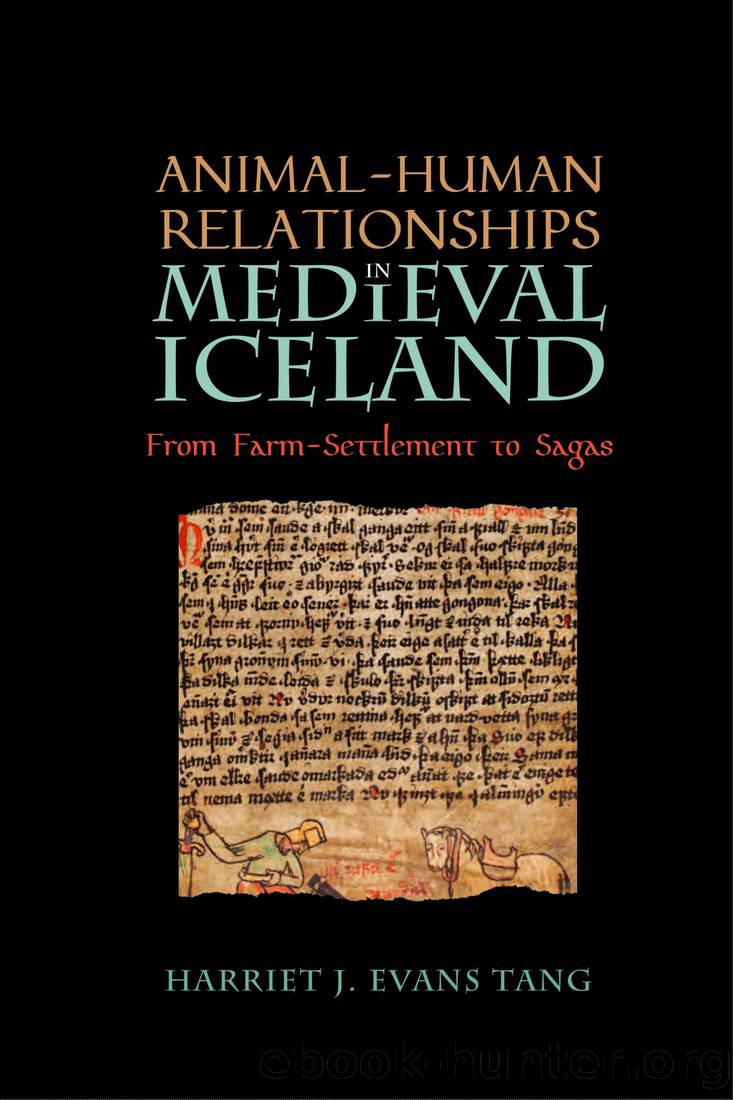Animal-Human Relationships in Medieval Iceland by Harriet Jean Evans Tang;

Author:Harriet Jean Evans Tang; [Tang;, Harriet Jean Evans]
Language: eng
Format: epub
ISBN: 9781843846437
Publisher: Boydell & Brewer
Published: 2022-08-30T00:00:00+00:00
The Householder and the Shepherd
As seen above in the multiple laws regulating animal herding, the householder is the most important figure for animal-human relationships in Grágás. Emphasis on the ultimate control a householder should have over his animals is further shown by a law that stipulates that it was unlawful for a woman to lend out her husbandâs horse when she, or the recipient of the loan, knew that the man would not agree to the lending.57 It was also unlawful for a man to drive another manâs stock away from a fold unless he had been instructed to do so by the owner.58 Presumably the farm workers responsible for herding work would have had a regular mandate to do so by the terms of their employment, but the presence of this clause in the text suggests the requirement for permission needed to be explicitly laid out and agreed, and that the obligation of care required by the householder towards his animals needed reinforcing. The unlawful taker of the animals in this situation would have to assume responsibility for this livestock until the owner claimed it back, and these texts repeatedly emphasise the responsibility of all men to care for the animals of another as they would their own.59 Nonetheless, the householder was required to ensure that his workers, and himself, maintained this high standard of care. In cases prosecuting negligent herding practices that caused a loss of milk, the figure who caused the loss of milk could defend himself by demonstrating that the owner of the livestock could have herded the animals in such a way as to prevent the loss.60 Such a defence suggests that the householder has the responsibility to have his animals herded in the best manner, and if he is the one most capable of doing so, then he should not hire this service out to a less capable figure.
As highlighted above, mishandling livestock, milking or otherwise, is presented as a serious offence in these laws, with the herding of these animals a heavily regulated and closely protected practice â and yet, it has been suggested that herding animals is depicted as a lower status activity in the Old Norse corpus.61 This emphasis on the need for correct handling of animals in Grágás, even if this means the householder should work with the animals, might indicate an effort to prevent men from deliberately hiring out their herding to less skilled figures because they did not wish to be seen herding their animals themselves, and then prosecuting the herder for damages caused. The uneasy relationships between skill and status, and animal herder and householder, are codified in the large number of regulations over herding in the laws, suggesting that while medieval Icelanders recognised the importance of animal care, some may have been less than willing to get their hands dirty. Likewise, the separation of human and animal places at Vatnsfjörður might reflect a similar anxiety, unlike the apparent closeness of some animals and humans at Sveigakot (Chapter 2, p.
Download
This site does not store any files on its server. We only index and link to content provided by other sites. Please contact the content providers to delete copyright contents if any and email us, we'll remove relevant links or contents immediately.
The Power of Myth by Joseph Campbell & Bill Moyers(1057)
Half Moon Bay by Jonathan Kellerman & Jesse Kellerman(979)
Inseparable by Emma Donoghue(976)
A Social History of the Media by Peter Burke & Peter Burke(970)
The Nets of Modernism: Henry James, Virginia Woolf, James Joyce, and Sigmund Freud by Maud Ellmann(891)
The Spike by Mark Humphries;(809)
The Complete Correspondence 1928-1940 by Theodor W. Adorno & Walter Benjamin(778)
A Theory of Narrative Drawing by Simon Grennan(774)
Culture by Terry Eagleton(770)
Ideology by Eagleton Terry;(731)
World Philology by(712)
Farnsworth's Classical English Rhetoric by Ward Farnsworth(711)
Bodies from the Library 3 by Tony Medawar(707)
Game of Thrones and Philosophy by William Irwin(707)
High Albania by M. Edith Durham(698)
Adam Smith by Jonathan Conlin(686)
A Reader’s Companion to J. D. Salinger’s The Catcher in the Rye by Peter Beidler(675)
Comic Genius: Portraits of Funny People by(649)
Monkey King by Wu Cheng'en(646)
